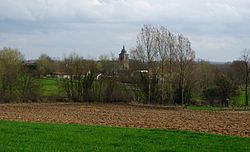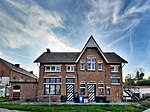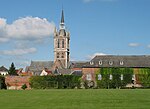Belgium, officially the Kingdom of Belgium, is a country in Northwestern Europe. The country is bordered by the Netherlands to the north, Germany to the east, Luxembourg to the southeast, France to the southwest, and the North Sea to the northwest. It covers an area of 30,689 km2 (11,849 sq mi) and has a population of more than 11.5 million, making it the 22nd most densely populated country in the world and the 6th most densely populated country in Europe, with a density of 376/km2 (970/sq mi). Belgium is part of an area known as the Low Countries, historically a somewhat larger region than the Benelux group of states, as it also included parts of northern France. The capital and largest metropolitan region is Brussels; other major cities are Antwerp, Ghent, Charleroi, Liège, Bruges, Namur, and Leuven.
Belgium is a sovereign state and a federal constitutional monarchy with a parliamentary system. Its institutional organization is complex and is structured on both regional and linguistic grounds. It is divided into three highly autonomous regions: the Flemish Region (Flanders) in the north, the Walloon Region (Wallonia) in the south, and the Brussels-Capital Region. Brussels is the smallest and most densely populated region, as well as the richest region in terms of GDP per capita. Belgium is also home to two main linguistic communities: the Flemish Community, which constitutes about 60 percent of the population, and the French Community, which constitutes about 40 percent of the population. A small German-speaking Community, making up around one percent of the population, exists in the East Cantons. The Brussels-Capital Region is officially bilingual in French and Dutch, although French is the majority language and lingua franca. Belgium's linguistic diversity and related political conflicts are reflected in its complex system of governance, made up of six different governments.
Since the Middle Ages, Belgium's central location has meant that the area has been relatively prosperous, connected commercially and politically to its bigger neighbours. The country as it exists today was established following the 1830 Belgian Revolution, when it seceded from the United Kingdom of the Netherlands, which had incorporated the Southern Netherlands (which comprised most of modern-day Belgium) after the Congress of Vienna in 1815. The name chosen for the new state is derived from the Latin word Belgium, used in Julius Caesar's "Gallic Wars", to describe a nearby region in the period around 55 BCE. Belgium has also been the battleground of European powers, earning the moniker "the Battlefield of Europe", a reputation reinforced in the 20th century by both world wars.
Belgium participated in the Industrial Revolution, and during the course of the 20th century, possessed a number of colonies in Africa. Between 1885 and 1908, the Congo Free State, which was privately owned by King Leopold II of Belgium, was characterized by widespread atrocities and disease; amid public outcry in Europe, Belgium annexed the territory as a colony. The Belgian colonies gained independence between 1960 and 1962. The second half of the 20th century was marked by rising tensions between the Dutch-speaking and the French-speaking citizens fueled by differences in language and culture and the unequal economic development of Flanders and Wallonia. This continuing antagonism has led to several far-reaching state reforms, resulting in the transition from a unitary to a federal arrangement between 1970 and 1993. Despite the reforms, tensions have persisted: there is particularly significant separatist sentiment among the Flemish, language laws such as the municipalities with language facilities have been the source of much controversy, and the government formation period following the 2010 federal election set the world record at 589 days. Unemployment in Wallonia is more than double that of Flanders, which boomed after the Second World War.Belgium is a developed country, with an advanced high-income economy. The country is one of the six founding members of the European Union, and its capital, Brussels, is also the de facto capital of the European Union itself, hosting the official seats of the European Commission, the Council of the European Union, and the European Council, as well as one of two seats of the European Parliament (the other being Strasbourg). Belgium is also a founding member of the Eurozone, NATO, OECD, and WTO, and a part of the trilateral Benelux Union and the Schengen Area. Brussels also hosts the headquarters of many major international organizations, such as NATO.











